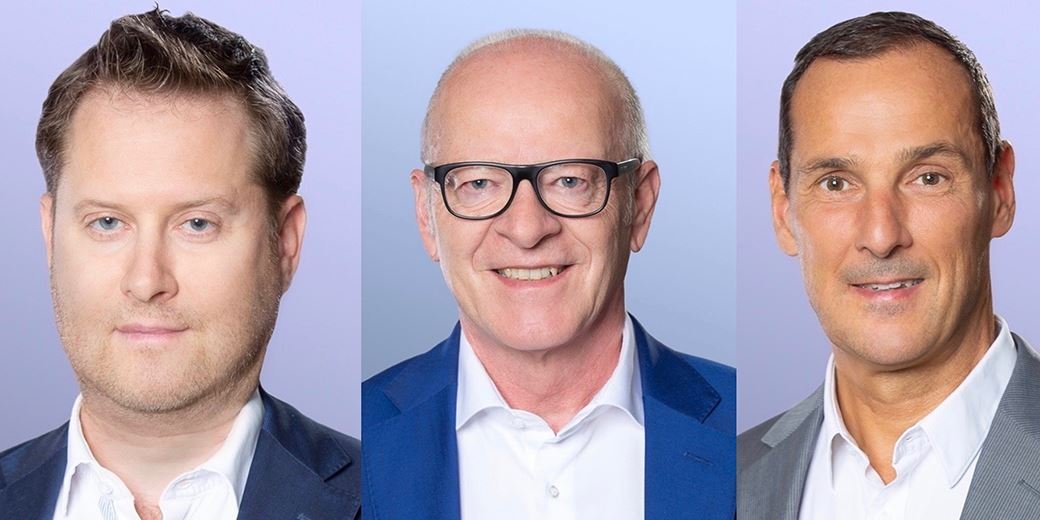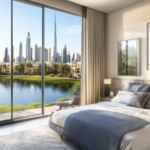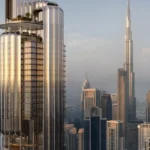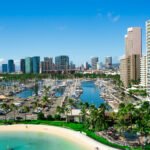Now Reading: Dubai’s Bold Green Tech Revolution: Building the Smart Cities of Tomorrow 2025!
-
01
Dubai’s Bold Green Tech Revolution: Building the Smart Cities of Tomorrow 2025!
Dubai’s Bold Green Tech Revolution: Building the Smart Cities of Tomorrow 2025!
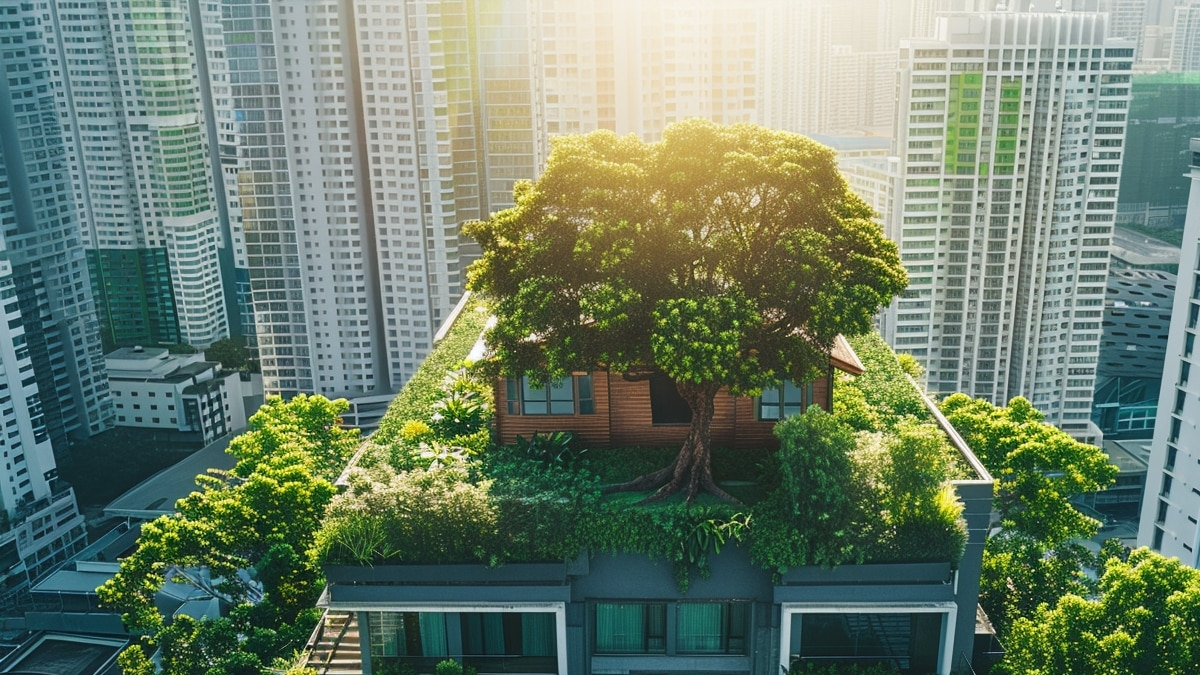
Table of Contents
In recent years, Dubai has emerged as a global leader in smart city innovation and green technology, setting high standards for sustainable urban development. Once known for its luxury and rapid urban expansion, Dubai is now investing heavily in eco-friendly solutions to fight climate change and reduce environmental damage. This transformation reflects the city’s broader vision to balance growth with sustainability, ensuring a cleaner, greener, and smarter future.
Dubai’s Green Vision: The Journey to Sustainability
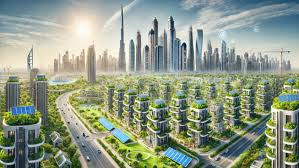
Dubai’s sustainability efforts are part of the UAE Vision 2030 and Dubai Clean Energy Strategy 2050. These plans aim to make Dubai a global hub for clean energy and green economy. The city targets to produce 75% of its energy from clean sources by 2050. To achieve this, the government is promoting solar power, electric vehicles (EVs), and energy-efficient buildings.
One of the city’s most ambitious projects is the Mohammed bin Rashid Al Maktoum Solar Park, the largest single-site solar park in the world. Once complete, it will have the capacity to generate 5,000 megawatts (MW) of clean energy, reducing over 6.5 million tonnes of carbon emissions annually. This project is a milestone in Dubai’s journey to becoming a carbon-neutral city.
Smart Cities: Blending Technology with Sustainability
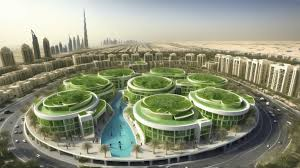
A major part of Dubai’s eco-friendly push involves developing smart city solutions. A smart city uses technology and data to improve urban life, reduce energy use, and protect the environment. Dubai’s Smart City initiative includes smart traffic systems, intelligent lighting, automated waste management, and energy-efficient public transport.
One shining example is The Sustainable City, located in the Dubailand area. It is Dubai’s first fully operational net-zero energy city. The community features solar-powered villas, green spaces, urban farming zones, and electric transport systems. Residents enjoy clean air, reduced energy bills, and a high-quality, sustainable lifestyle.
Additionally, AI (Artificial Intelligence) and IoT (Internet of Things) are playing big roles. These technologies monitor energy consumption, control lighting, and manage water usage in real-time, saving resources and reducing waste. Smart meters and sensors across Dubai’s buildings ensure that electricity and water are used efficiently.
Green Transport: Driving the Eco-Friendly Movement
Transportation is a key part of Dubai’s green revolution. The city is expanding its electric vehicle charging network, encouraging residents to switch to EVs. The government offers incentives like free parking, reduced toll fees, and tax exemptions to promote the adoption of EVs.
Dubai also launched the Green Mobility Strategy 2030, which focuses on making public transport eco-friendly. The Dubai Metro—one of the world’s longest fully automated metro networks—is a model of clean mass transit. Dubai’s Roads and Transport Authority (RTA) is also testing electric buses and hydrogen-powered taxis to reduce air pollution and carbon emissions.
In the near future, driverless electric cars may become a common sight on Dubai’s roads. The city plans to make 25% of all transport autonomous by 2030, further cutting down fuel consumption and harmful emissions.
Green Buildings and Eco-Friendly Architecture
Dubai’s skyline is famous for its modern skyscrapers, but now the city is adding a green twist to its architecture. New buildings must follow strict green building codes that promote energy efficiency, water conservation, and the use of sustainable materials.
A great example is the Museum of the Future, designed to be a model of sustainable design. It uses solar energy, intelligent ventilation systems, and water recycling technologies. Dubai’s property developers are also building more LEED-certified (Leadership in Energy and Environmental Design) buildings, which meet international environmental standards.
Waste Management: Turning Trash into Treasure
Dubai is also focusing on managing waste smartly. The city has introduced automated waste collection systems, separating recyclables from general waste. In 2023, Dubai opened the largest waste-to-energy plant in the world, which can process 5,666 tonnes of solid waste daily, converting it into clean energy.
Such projects not only reduce landfill waste but also generate electricity for thousands of homes, contributing to the city’s energy goals.
The Role of Public Awareness and Innovation
Dubai’s success depends not only on government policies but also on public support and awareness. Educational campaigns encourage residents to save energy, recycle waste, and adopt eco-friendly habits. Dubai is also inviting local and international companies to develop new green technologies through innovation hubs and startup incubators.
Events like Expo 2020 Dubai highlighted the importance of sustainability, showcasing future technologies that can help cities around the world become greener and smarter.
Challenges Ahead
Despite the progress, Dubai still faces challenges. The hot desert climate makes water scarcity a major issue. Desalination plants, while necessary, consume large amounts of energy. Balancing water needs with energy use remains a difficult task.
Also, as the city grows, maintaining green spaces and preventing urban heat islands will require more planning. Experts suggest investing in vertical gardens, rooftop farms, and urban forests to improve air quality and reduce heat.
A Green Model for the World?
Dubai’s efforts are closely watched by other cities looking to balance economic growth with environmental care. Its blend of green tech, smart infrastructure, and strong government vision positions it as a model for future sustainable cities worldwide.
If Dubai’s ambitious plans succeed, the city could become the world’s first truly sustainable, high-tech metropolis—showing that luxury, progress, and eco-friendliness can go hand in hand.
Conclusion
Dubai’s push for green tech and smart cities is more than just a trend—it is a necessary response to the planet’s environmental challenges. By combining innovation, public policy, and citizen involvement, Dubai is paving the way for a cleaner, smarter, and more sustainable urban future.
Read More:- Shobha Realty Launches Its Most Luxurious Project Yet—Full Details Inside 2025




